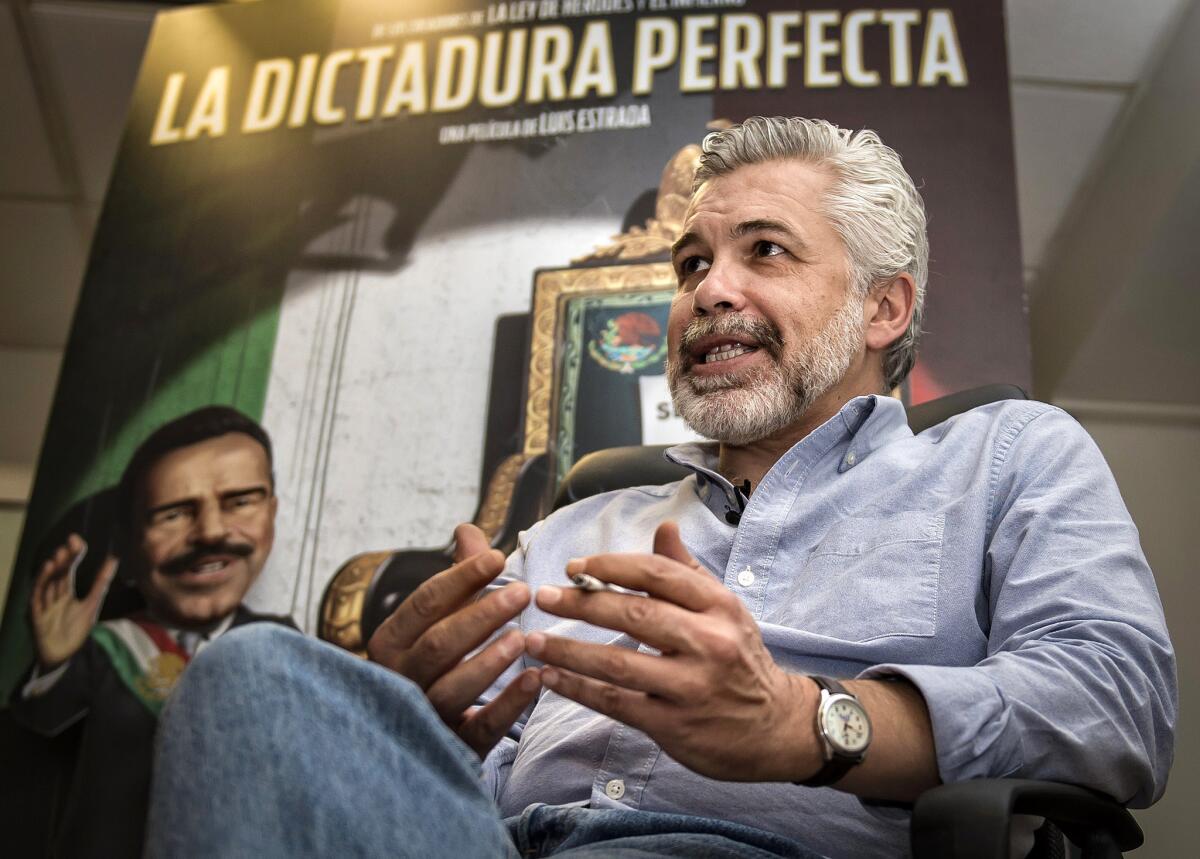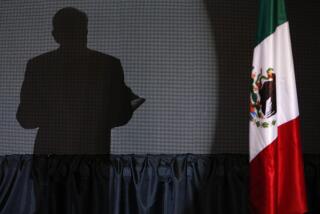Mexican filmmaker Luis Estrada’s satirical agenda hits home

The hottest movie in Mexico opens with an unusual disclaimer: Any resemblance to reality is not a mere coincidence.
That’s the kind of line audiences have come to expect from director Luis Estrada, whose searing satirical films about contemporary Mexico have provoked the wrath of the political establishment. His latest, “La Dictadura Perfecta” (The Perfect Dictator), is pulled from real headlines and has made waves since it opened last month.
Moviegoers in this nation plagued by corruption scandals and drug violence will recognize the story of a crooked politician caught on tape accepting a suitcase filled with cash and the image of dead bodies strung from a highway overpass.
They will nod knowingly as the president puts his foot in his mouth — again — and as a crew of greedy television executives decides to stage a fake news event to draw more viewers.
In the film, those scenarios play as juicy drama, but walking out of a theater after seeing the film, Mary Esther Gomez, 39, said the many parallels were eerie. “I don’t know if I just watched a movie or the evening news,” she said.
Critic Alvaro Cueva, writing in the Milenio newspaper, called the film “the fiercest criticism that has ever been made of the media in Mexico and Latin America.”
The film’s message of media manipulation and corruption at the highest levels lands at a turbulent time, with Mexicans demanding answers in the September disappearance of dozens of students in the violent southern state of Guerrero. Many Mexicans believe the students have been killed, allegedly by a drug gang on the supposed orders of a local mayor. On Oct. 23, Guerrero Gov. Angel Aguirre resigned over the scandal.
Speaking at a movie studio on the southern edge of Mexico City last week, Estrada called Aguirre “worse” than the crooked characters in his film and said the events in Guerrero are a “product of the degradation of the political class” — something his films have been pointing to for years.
Previous movies, including 1999’s “El Ley de Herodes” (Herod’s Law) and 2010’s “El Infierno” (Hell), skewered Mexico’s long-dominant Institutional Revolutionary Party, known in Mexico as the PRI, and the country’s bloody war on drugs.
“La Dictadura Perfecta,” a black comedy featuring several of Mexico’s top stars, takes on the country’s tightly controlled media landscape and what Estrada views as its complacent television audience.
It tells the story of TV MX, a powerful media conglomerate in cahoots with politicians and willing to do anything for ratings.
After a televised gaffe by Mexico’s president — whose slicked-back pompadour recalls the manicured coif of real-life head of state Enrique Peña Nieto — the leader’s advisors go into damage-control mode, planting a scandalous video showing the governor of an unnamed state accepting a suitcase of money from a leader of a drug cartel.
Panicking, the wayward governor decides to try his hand at media manipulation, paying the television station’s executives to clean up his image. They do so by providing sensationalized coverage of the kidnapping of a pair of twin girls — and then staging a fake rescue by the governor, who also runs for president.
The fictionalized TV MX is a barely veiled stand-in for Televisa, the world’s largest Spanish-language media company. It was accused in years past of propping up the PRI, which held power from the turbulent years after the Mexican Revolution until 2000, when opposition candidate Vicente Fox took the presidency. When the party returned to power in 2012 with the election of Peña Nieto, Televisa was accused of pro-PRI bias during the campaign.
Estrada critiques Mexico’s media landscape in “La Dictadura Perfecta,” and it nearly cost him the movie.
After the success of his previous pictures, a subsidiary of Televisa had agreed to distribute the director’s next film, Estrada said.
But the company’s managers pulled their backing after they saw an early cut of the film, he said, and Estrada had to scramble to find an alternative. A representative from Televisa did not respond to requests for comment.
“There are many people who don’t like the mirror I’m holding,” said Estrada, who has previously run afoul of powerful forces in Mexico.
Former President Felipe Calderon accused Estrada of “demolishing national spirit” with “El Infierno,” which criticized the government’s response to the drug war. Previous films faced government censorship.
The new film’s title is a reference to a comment made in 1990 by Peruvian writer Mario Vargas Llosa, who described the PRI’s 71-year grip on power as “the perfect dictatorship” camouflaged as democracy.
Despite the controversies, Estrada’s message has found a large audience outside the halls of power.
After one of the highest-grossing weekends in Mexican film history, “La Dictadura Perfecta” has made nearly $8 million since it opened on 2,000 screens.
Cueva says Estrada has turned a highbrow critique of Mexican society into something digestible for the average moviegoer. “Watching an actor play a television anchor who is manipulating the news is different than watching an intellectual attack a television program in a pompous voice at a university,” the critic wrote.
He said it produced “another result, which passes first through the gut and then to the brain.”
Some audience members agreed, saying the film had a cathartic effect.
At a screening in Mexico City, Oscar Ortiz emerged with tears in his eyes.
“Even though it seems like fiction, it’s the truth,” said Ortiz, a 30-year-old doctor.
He said the film hadn’t been easy to watch.
“It is very painful,” he said. “Because it’s my country.”
Cecilia Sanchez of The Times’ Mexico City bureau contributed to this report.
More to Read
The biggest entertainment stories
Get our big stories about Hollywood, film, television, music, arts, culture and more right in your inbox as soon as they publish.
You may occasionally receive promotional content from the Los Angeles Times.











